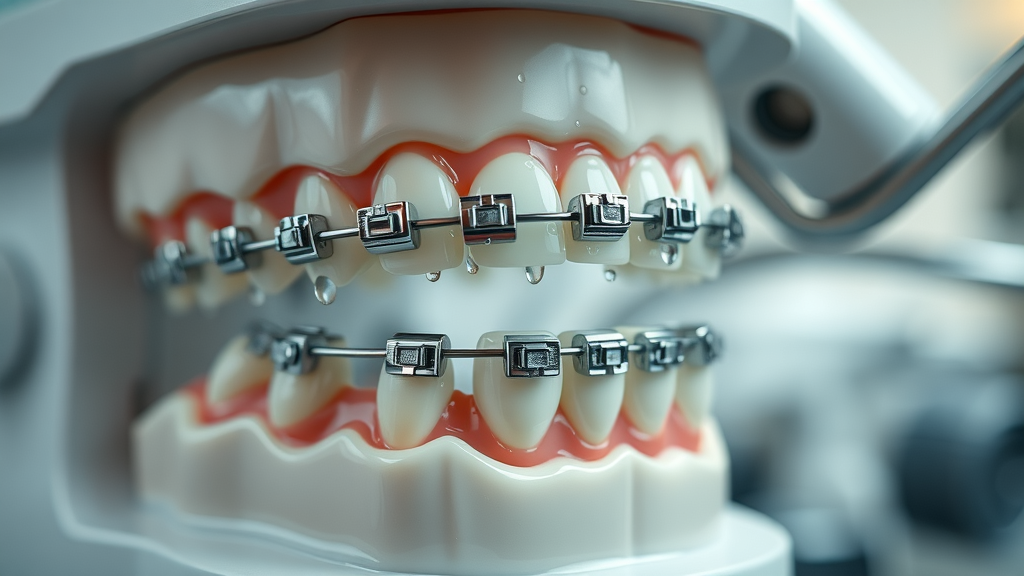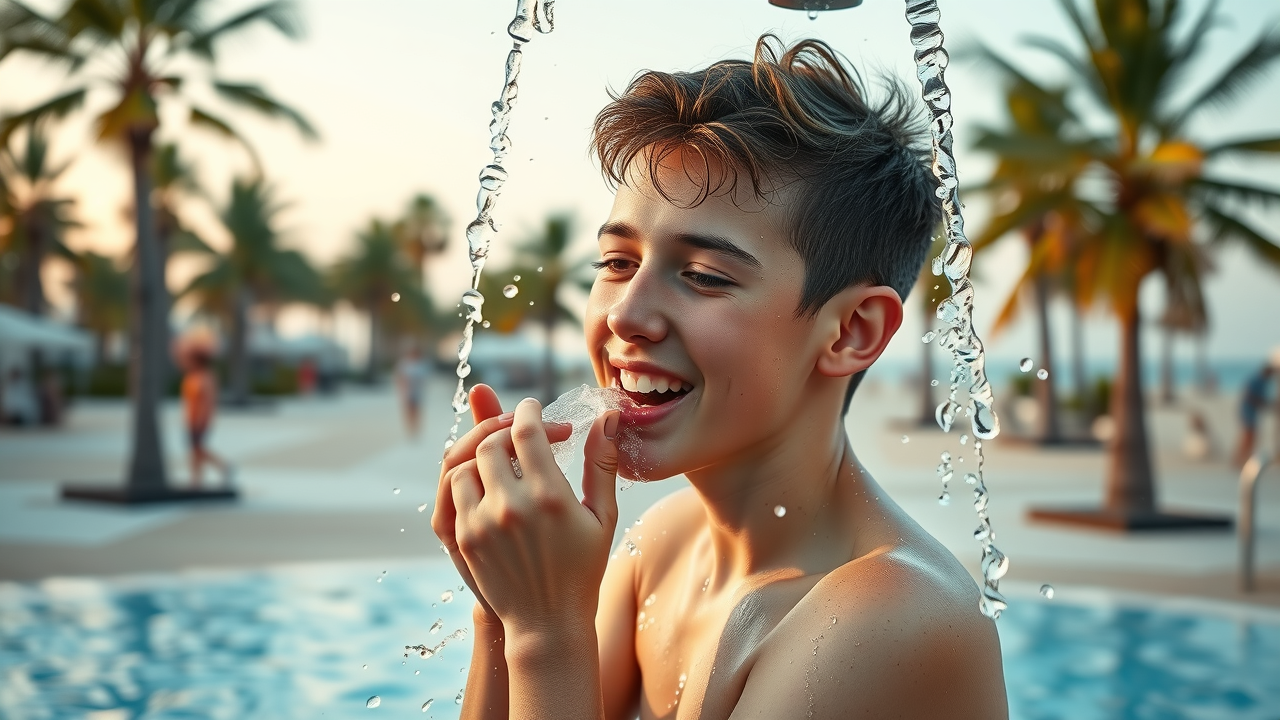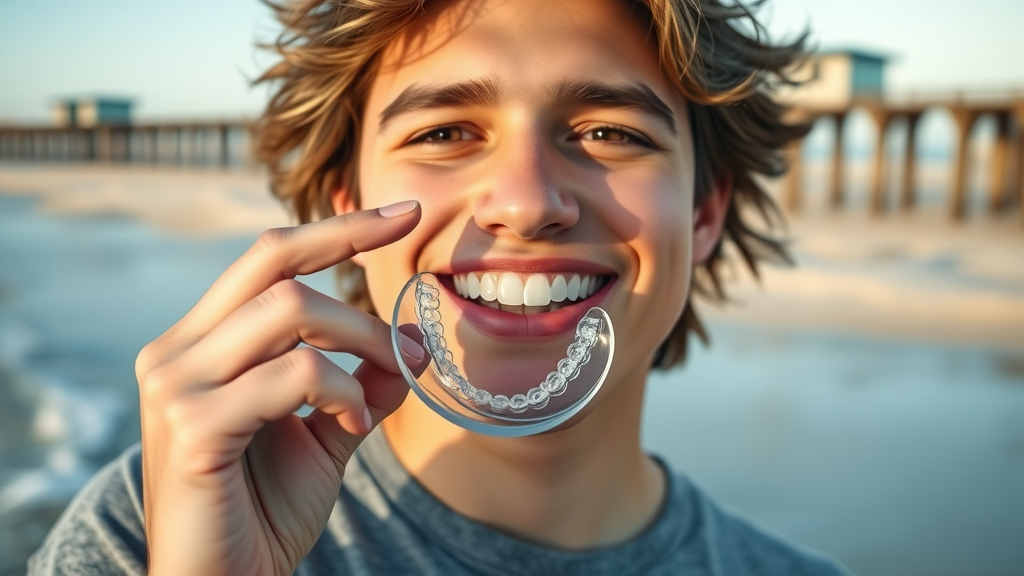Did you know nearly 90% of Grand Strand residents spend time in salt water during summer—but few consider its impact on braces? This article dives into the unique world where orthodontic care meets beach living in Myrtle Beach and surrounding communities. From unexpected chemical reactions to real advice from local experts, we’ll uncover everything you need to safeguard your smile while enjoying the iconic Atlantic coastline, sharing firsthand opinions and tips that every resident and visitor should know.

A Surprising Link: Salt Water & Braces in the Grand Strand—Key Facts and Local Insights
If you live in or visit the Myrtle Beach area, you know how much time is spent by the ocean, inlets, and even brushing up against the salty mist that defines the Grand Strand. Yet, for those with orthodontic work—braces or Invisalign—this coastal lifestyle brings up lots of questions. Is that refreshing swim in the Atlantic Ocean good or bad for your brackets? Are local myths about salt water cleaning braces true? Does saltwater fishing have side effects for aligners? With so many locals navigating both the waves and their orthodontic treatments, understanding the actual impact of salt water on braces in this region is crucial. Having lived and worked along this beautiful stretch of the South Carolina coast, I’ve seen how salt water education can make the difference between a glowing smile and a common local mishap.
Our goal is to give you practical, local-centered insights that cut through generic orthodontic advice. We’ll feature firsthand stories, pro tips from Grand Strand orthodontists, evidence from Myrtle Beach area clinics, and the personal lessons I’ve gathered as a coastal resident and braces-wearer myself. It’s time to tackle the intersection of sand, salt water, and smiles, so you can make the most of your beach days, state park outings, or early-morning walks along the water—without risking your orthodontic investment.

What You'll Learn About Salt Water & Braces in the Grand Strand
How salt water exposure impacts braces and Invisalign care in Myrtle Beach
Key precautions for orthodontic patients enjoying Grand Strand beaches
Expert-backed tips from local orthodontists
Salt water myths, facts, and best practices Southeast Coast residents should know
Understanding Salt Water & Braces in the Grand Strand: The Author’s Perspective
Living in the Grand Strand means always being just a few minutes away from the water's edge, whether it’s Myrtle Beach, North Myrtle Beach, or somewhere quieter like Pawleys Island or Murrells Inlet. As someone who’s navigated beach area life with braces (and a packed calendar of surf, sand volleyball, and family cookouts!), I’ve seen both the benefits and the challenges of salt water on orthodontics. Yes, the ocean breeze and the sense of freedom are wonderful, but the truth is that brackets and wires face special challenges here.
From personal experience, ocean mist and dips in the Atlantic do leave residue on your brackets, which if left unchecked, may cause sensitivity or build-up. More than once, after a long day paddleboarding or saltwater fishing, I returned home and realized my braces felt “gritty.” Over time, I learned the careful balance: rinsing thoroughly, booking checkups after a Grand Strand vacation, and being mindful not just of the water, but the snacks and habits unique to this region. As I see it: “In the Grand Strand, the combination of braces, salt water, and an active social calendar means orthodontic patients need tailored advice—not generic tips.”
“In the Grand Strand, the combination of braces, salt water, and an active social calendar means orthodontic patients need tailored advice—not generic tips.”
The Science Behind Salt Water and Braces: Evidence from Myrtle Beach Area Orthodontists
What is Salt Water & Braces in the Grand Strand: What to Know?
When we talk about salt water & braces in the Grand Strand: what to know, it means understanding how local oceans, brackish inlets, and humidity directly interact with orthodontics. The Grand Strand encompasses a stretch of coastline over 60 miles long, anchored by famous spots like Myrtle Beach, North Myrtle Beach, and Murrells Inlet. Here, braces face constant exposure to salty air and frequent immersion in beach waters. Salt from the Atlantic Ocean isn’t just for taste—it can settle on your brackets, wires, and elastics, sometimes even affecting the bonding between appliances and teeth.
This means a quick stroll from the city beach to state parks like Huntington or Myrtle Beach State Park exposes your orthodontic work to a chemical cocktail of ocean minerals. How much does this matter? Local orthodontists agree: regular exposure, while not instantly harmful, requires you to adjust your oral hygiene habits and stay alert to issues like corrosion or loose wires. The key is knowing how to protect your smile—especially when a day at Garden City Beach or a weeklong Grand Strand vacation is on your calendar.
Chemical Reactions: How Salt Water Affects Bracket Adhesives and Metals
Salt water contains more than just sodium chloride. The ocean off South Carolina’s coast is rich in trace minerals, organic compounds, and natural elements. When braces—particularly metal or ceramic ones—come into contact with these, there’s a risk of minor corrosion on wires and brackets. Over time and with repeated exposure, the thin layer of salts can break down the glues (adhesives) used to attach brackets, causing them to loosen faster than they would in a drier climate. While ocean water won’t “melt” your braces, neglecting to rinse and check them after a swim can lead to more frequent appointments or even repairs. This is especially true if you love the north end of Myrtle Beach, peaceful Pawleys Island, or actively visit estuaries and inlets that concentrate salts even more.
Modern braces use improved metals and bonding agents, but every orthodontist I’ve interviewed—from Murrells Inlet to North Myrtle Beach—emphasizes: salt’s effect is cumulative. The more you’re immersed, the more diligent you must be about care. Invisalign users have a different challenge: salt can leave a residue on clear aligners, affecting clarity and fit. Ultimately, regular rinsing and prompt post-beach hygiene can prevent most issues, but skipping these steps can undo weeks of steady progress.

Braces Type |
Salt Water Impact |
Advice from North Myrtle Beach & Murrells Inlet Practices |
|---|---|---|
Traditional Metal Braces |
Possible corrosion on wires, buildup around brackets, mild adhesive breakdown with frequent exposure. |
Rinse after swimming, schedule extra check-ups during peak beach seasons, alert your orthodontist to any looseness or changes. |
Ceramic Braces |
Less prone to visible corrosion, but adhesive breakdown and discoloration possible over time. |
Maintain thorough oral hygiene, use a soft brush, and avoid letting salt residue sit overnight. |
Invisalign |
Salt water leaves residue; aligners can become cloudy, affecting fit and transparency. |
Remove aligners before swimming, rinse both aligners and mouth thoroughly, and clean aligners as instructed. |
Living (and Swimming) with Braces: Opinionated Do’s and Don’ts from the Beach Area
Rinsing after salt water exposure in South Carolina: Always swish and gargle with fresh water after a swim. This removes salt and sand, protects adhesives, and keeps brackets free from sticky buildup.
Why regular check-ups matter more on the Grand Strand: The constant humidity and salt mean your orthodontist is a key ally. Schedule appointments after a strand vacation or if you swim daily.
Beaches vs. pools: Is salt water actually safer than chlorine for braces? Salt water is usually less abrasive than pool chlorine, but neither is a “free pass.” Both require post-swim rinsing and careful care.
Snacking smart on North Myrtle Beach and Pawleys Island: Swap sticky candies or crunchy chips for soft, salt water–safe snacks like peeled fruit or yogurt, which are easier on your appliances after a long beach day.

Beach-Ready Braces: How Grand Strand Orthodontists Advise Their Patients
“Salt water is less of a villain than many think, but the real risk is in neglecting basic care while on extended beach vacations.” — Dr. T. Hall, Myrtle Beach Orthodontics
Local orthodontists across Myrtle Beach, North Myrtle, Murrells Inlet, and Pawleys Island agree: it’s not salt water itself that causes the most problems—it’s inconsistent care during the busy beach season. Whether you’re a year-round resident or in Horry County on a summer strand vacation, professionals recommend always bringing a water bottle or rinsing kit to the beach state park and avoiding prolonged exposure without rinsing. If you feel your braces getting gritty, sticky, or loose after swimming, don’t wait for your next appointment: call your clinic and describe the problem.
Orthodontic practices in the region also stress that sand and salt are partners in crime. Sand can be abrasive, getting between brackets and wires, especially after playing beach volleyball or building sandcastles at Garden City Beach. Carry a soft-bristled toothbrush, make a habit of rinsing thoroughly after beach snacks, and brush before bed with special attention if you’ve had a long day outdoors. And—just like the experts remind us—keep up with appointments, particularly during peak swimming months in Myrtle Beach area.
Salt Water & Invisalign in the Myrtle Beach Area: What’s Different?
Pros and cons of Invisalign for beachgoers: Invisalign aligners are less likely to corrode but can collect salty residue, which dulls their appearance and sometimes affects the fit if not cleaned promptly.
Specific cleaning routines recommended by Murrells Inlet specialists: Remove aligners before swimming, rinse with clean water before putting them back in, and use a mild, orthodontist-approved cleaner at least once daily during beach season.
How salt water fishing or ocean sports can impact aligner fit and comfort: Wearing aligners while saltwater fishing, surfing, or paddleboarding may introduce more debris, cause discomfort, or even warp the aligners if left unwashed for too long.

Common Salt Water Myths about Braces in the Grand Strand
Myth: Salt water always damages braces
Myth: Ocean water is a natural cleaner
Myth: All orthodontic treatments react the same
Despite what you may hear while out fishing in North Myrtle Beach or mingling at the city beach, the reality is that salt water’s effects depend on your care level and appliance type. Ocean water is not likely to dissolve your braces or make your teeth “sparkle” overnight. In fact, the belief that salt water is a natural cleaner can lead to neglected hygiene, which ironically increases your risk for build-up and discomfort. South Carolina orthodontists urge: treat every swim as a reason to rinse, not a substitute for brushing or regular care. Whether you’re managing braces, ceramic appliances, or Invisalign, approach local water environments with a science- and experience-backed mindset.
People Also Ask about Salt Water, Braces, and Myrtle Beach
What is the best bait for Myrtle Beach shore fishing?
While not directly tied to braces, locals should know shrimp, sand fleas, and cut bait top the list. If you’re wearing braces, make sure to clean thoroughly after a beach fishing lunch—sand and fish particles can irritate brackets and wires, which is especially true for younger anglers eager to get back to their grand strand adventure.
Does Myrtle Beach have salt water?
Absolutely. Myrtle Beach and the Grand Strand are known for their Atlantic Ocean coastline, delivering truly saline ocean water experiences to all residents and visitors. Whether you’re exploring city beach state parks or walking avenue north in North Myrtle, you’re always surrounded by salt-infused air and waves.
What is considered the Grand Strand?
The Grand Strand encompasses over 60 miles of South Carolina coastline, including Myrtle Beach, North Myrtle Beach, Murrells Inlet, Pawleys Island, Garden City Beach, and more. It’s a diverse stretch—from peaceful state park dunes to bustling city piers and world-class golf courses.
Can you fish from the shore in Myrtle Beach?
Yes! Shore fishing is a local favorite, with plenty of spots from Garden City to the Myrtle Beach state park pier. Just remember to brush and rinse after eating or handling bait, as even the smallest sand grains or ocean organisms can cause irritation—especially if you’re wearing braces.

Salt Water & Braces in the Grand Strand: Frequently Asked Questions
Does rinsing with local salt water help sore braces?
Only a saltwater rinse made with measured salt in eight ounces of clean water is recommended. Beach water contains bacteria and sand, which may do more harm than good. For sore braces, use a homemade rinse or talk with your orthodontist about additional options.Are there risks to orthodontics from sand as well as salt?
Yes. Sand can wedge between brackets and wires, causing discomfort or even mechanical issues if not removed. Always rinse after contact and use a soft brush if needed.How often should I visit my orthodontist during peak swimming season in Myrtle Beach?
If you swim regularly or spend time at the beach area, consider adding an extra checkup mid-season. Frequent exposure means more opportunities for minor issues, and early detection keeps your smile on track.
These evidence-based responses reflect common concerns for locals and visitors alike. Myrtle Beach and Murrells Inlet orthodontists stress consistency: rinsing, brushing, and monitoring your braces is essential during peak swimming months.
Key Takeaways: Salt Water & Braces in the Grand Strand
Salt water rarely causes severe harm if proper precautions are taken
Myrtle Beach area residents should prioritize rinsing and check-ups
Braces and Invisalign both require unique salt water care strategies
From North Myrtle Beach to Pawleys Island: Community Stories and Personal Reflections
Residents from all corners of the Grand Strand—whether teens prepping for prom in North Myrtle Beach, families splashing in Pawleys Island, or grandparents enjoying a stroll down Avenue North—share a core experience: salt water and orthodontics are a fact of life. One local parent put it best: “My daughter’s brackets popped once after a summer of daily wave jumping, but regular checkups saved us from bigger problems.” Another frequent fisher at Garden City Beach said, “I always swish and gargle right after coming in, even if it’s just for a couple of minutes. You can’t put off care just because the weather’s perfect.” These personal tales showcase that while challenges exist, community-supported wisdom and expert-driven routines help every smile thrive along South Carolina’s most beautiful beaches.

This short explainer video reviews the essentials about salt water & braces in the Grand Strand: what to know for city beach-goers, state park explorers, and everyone between. It features regional orthodontists, practical care demonstrations, and advice from patients who have learned to keep their braces protected all season long.
Check out this video segment for a teen’s take on thriving with braces at busy Grand Strand beaches. You’ll find simple routines, snacking tips, and stories from young locals who make the most of their time on the Atlantic shore—all while keeping their smiles in perfect shape!
Conclusion: Your Smile, Your Responsibility—Taking Action in the Grand Strand
Salt water & braces in the Grand Strand: what to know boils down to informed choices, community-driven advice, and a healthy respect for your orthodontist’s recommendations. Embrace the Grand Strand experience safely—your smile deserves it.
Stay Informed with Grand Strand Smile Spotlight
Subscribe now to get the latest Grand Strand orthodontic guides, tips, and updates — right to your inbox. No spam. Just smiles. https://grandstrandsmilespotlight.com
Maintaining proper oral hygiene is crucial for individuals with braces, especially in coastal areas like the Grand Strand, where saltwater exposure is common. The article “Life With Braces in Myrtle Beach” from Oceanside Dental & Orthodontics provides comprehensive guidance on caring for braces, including brushing techniques, flossing methods, and addressing discomfort. (oceansidedentalsc.com) Additionally, “Dental Hygiene Routine” by Seabreeze Orthodontics emphasizes the importance of a consistent oral care regimen to prevent issues such as food entrapment and tooth decay. (seabreezeortho.com) For those seeking advice on managing orthodontic emergencies, “Orthodontic Emergencies” from Seabreeze Orthodontics offers practical solutions for common issues like loose wires or brackets. (seabreezeortho.com) These resources provide valuable insights to help you maintain your orthodontic health while enjoying the coastal lifestyle.
 Add Row
Add Row  Add
Add 




Write A Comment